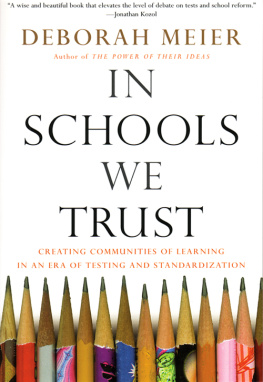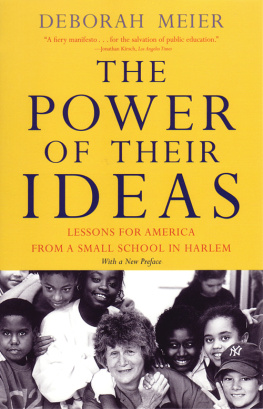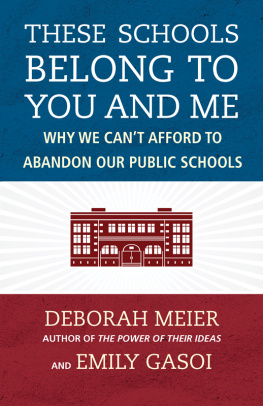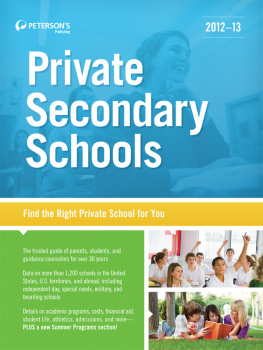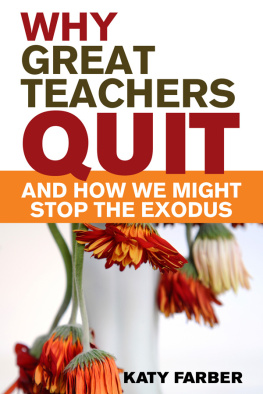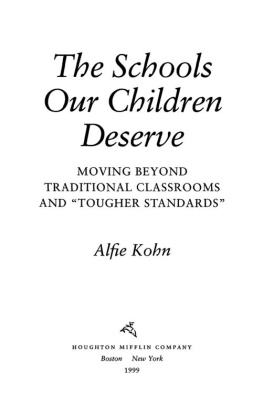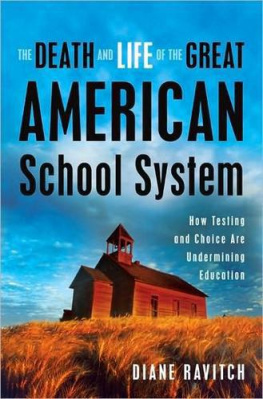
ALSO BY DEBORAH MEIER:
The Power of Their Ideas:
Lessons for America from a Small School in Harlem
Will Standards Save Public Education?

To Vito Perenne,
my friend, colleague, and leader
I would not lead you to the promised land, because if I could, others could lead you back again.
Eugene V. Debs, 1921
INTRODUCTION
F ive years ago, when I wrote about small schools in East Harlem and what they had to teach the nations schools, I couldnt have imagined the landscape of education we find ourselves in today. That standardized testing would make a spectacular comeback seemed extremely unlikely. That the majority of states would decide who should be promoted or who should graduate from high school or how much to pay teachers and principals on the basis of standardized test scores seemed far-fetched. That even a conservative federal administration, committed in principle to local control, would mandate annual high-stakes tests for every local schoolhouse in the nation seemed politically impossible. And yet all this has come to pass, and more.
I certainly couldnt have predicted how quickly the lives of schools and kids would be affected by these changes. Schools are increasingly organized around testing, with grave consequences from kindergarten through high school. Children are pressed into earlier and earlier formal literacy activities in order to improve test scores. Learning about the world has been translated, even for four-year-olds, into formats conducive to evaluation by standardized tests. One major city has even outlawed recess in the service of increased desk time. Kids are monitored from morning to nightfall by increasingly undervalued and constrained adults, in highly bureaucratic and powerless institutional settingsand told to keep their noses to the grindstone.
The dominant American attitude toward schooling these days, embodied in all these changes, is a fundamentally new level of distrust. We dont trust teachers judgment, so we constrain their choices. Nor do we trust principals, parents, or local school boards. We dont trust the public school system as a whole, so we allow those furthest removed from the schoolhouse to dictate policy that fundamentally changes the daily interactions that take place within schools. Nor do we trust in the extraordinary human penchant for learning itself. I believe that this far-reaching distrust has its roots in facts about our lives that go well beyond schooling. There are, after all, good reasons for buyers to beware the goods being sold them, including those that come from their local schools. But whatever the origins, social distrust plays itself out in education in the form of draconian attempts to restore accountability through standardized schooling and increasing bureaucratization.
The tragedy of this approach is that it undermines what I think is the best way to make schools trustworthy and raise standards. Standardization and bureaucratization fuel the very distrust they are aimed to cure. Even more tragically, standardization and bureaucratization undermine the possibilities for the kind of education we all claim is sorely lacking. Some of the good news I celebrated five years ago remains good, for sure. Both small schools and public school choice, for example, have increasingly more powerful support in various places. But the larger vision of education those reforms serve is threatened.
This book is about the possibility of a different way to organize our childrens schooling. Like some of the proponents of tests and standardization, I too am obsessed by the issue of accountability and adult responsibility for our children. Like them, I believe that the traditional public schools have failed to serve too many peoples intellectual needs, including a substantial minority whose children have been dramatically abandoned to unworkable schools. But I believe that the solution lies in the opposite direction. Schools are asked to achieve an extraordinary and revolutionary goalto provide all children with the kind of schooling once offered only to a small elitebut they are being forced to continue working within factory-style models of schooling and accountability that not only work against that goal but, as I argue, make it impossible. The issue of trust needs to be tackled head-on if we are to embrace this expansive vision of education, by enhancingnot diminishingthe authority and judgment of those who know our children best. We need to examine the varied meanings of trust and carefully rebuild, one by one, schools that are trustworthy. For children, there is no shortcut to becoming thoughtful, responsible, and intellectually accomplished adults. What it takes is keeping company with adults who exercise these qualities in the presence of adults-to-be. As Mike Rose notes in his indispensable book Lives on the Boundary, To have a prayer of success, well need many conceptual blessings, above all a revised store of images... that celebrate the plural, messy human reality of educational excellence. I hope to give the reader, from my experience in schools, images of trustful multiage settings very different from those we now hold in our heads.
The message of this book, then, is not just trust us. The title, with its echoes of in God we trust, is a provocation, not an invocation. Our schools must never be beyond question, argument, debate. First, our schools dont deserve such trust; second, I dont think it would be healthy for us to invest such trust in any secular institution, and surely not in any democratic institution. I invoke the religious parallel as a challenge: What kind of trust can and should we have in our schools? What kind of trust should we practice within their walls? The trust I have in mind is not based on blind faith. It is a hard-won, democratic trust in each other, tempered by healthy, active skepticism and a demand that trust be continually earnedwhat school people these days call the demand for accountability. Trust is thus a goal and a tool. If there is faith involved in the kind of trust I have in mind, it is faith in the extraordinary drive and capacity of all children to learn and in the ability of ordinary adults to be powerful, active citizens in a democracy. This trust demands that we cope even when trust is occasionally betrayed, as it inevitably will be, if we want schools that enable kids to cope with modern and democratic life, and if we want this for not some but all kids. The schools whose stories this book tells are all public schools built around trusted adults. They are merely a small sample of the thousands of such schools in this nation, whose stories we too often ignore. These are communities that are warily, often quarrelsomely determined to stick with each other for the sake of the kids. Within these communities, teachers are encouraged to talk to each other, debate things of importance, and use their judgment on a daily basis. Parents meet with teachers frequently and press for their own viewpoint. Sometimes they make trouble. Kids learn the art of democratic conversationand the art of passing judgmentby watching and talking to teachers whom the larger community shows respect for and who in turn show respect for their communities. Principals are partners with their faculties and have the respect of their communities. Everywhere you look, in such schools, people are keeping company across lines of age and expertise. Innumerable casual as well as formal interactions take place between generations. And there are plenty of checks and balances to support appropriately skeptical families, citizens, and taxpayers. But the bottom line is, the school has sufficient authority to act on its collective knowledge of its children.
Next page
